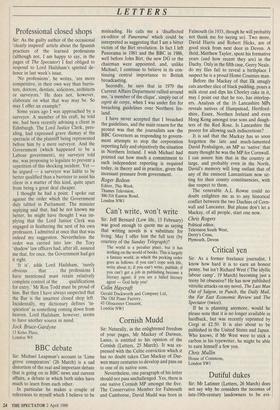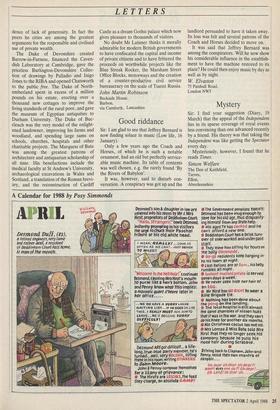Dutiful dukes
Sir: Mr Latimer (Letters, 26 March) does not say why he considers the incomes of late-19th-century landowners to be evi-
LETTERS
dence of lack of generosity. In fact the peers he cities are among the greatest arguments for the responsible and civilised use of private wealth.
The Duke of Devonshire created Barrow-in-Furness, financed the Caven- dish Laboratory at Cambridge, gave the priceless Burlington-Devonshire Collec- tion of drawings by Palladio and Inigo Jones to the RIBA and opened Chatsworth to the public free. The Duke of North- umberland spent in excess of a million pounds on his estate, erecting over a thousand new cottages to improve the living standards of the rural poor, and gave the museum of Egyptian antiquities to Durham University. The Duke of Buc- cleuch was the very model of the enlight- ened landowner, improving his farms and woodland, and spending large sums on schools, churches, hospitals and other charitable projects. The Marquess of Bute was among the greatest patrons of architecture and antiquarian scholarship of all time. His benefactions include the medical faculty at St Andrew's University, archaeological excavations in Wales and Scotland, a translation of the Roman brevi- ary, and the reconstruction of Cardiff
Castle as a dream Gothic palace which now gives pleasure to thousands of visitors.
No doubt Mr Latimer thinks it morally admirable for modern British governments to have confiscated the capital and income of private citizens and to have frittered the proceeds on worthwhile projects like the Blue Streak Rocket, the Marsham Street Office Blocks, motorways and the creation of a counter-productive civil service bureaucracy on the scale of Tsarist Russia. John Martin Robinson
Beckside House, Barbon, via Carnforth, Lancashire



















































 Previous page
Previous page